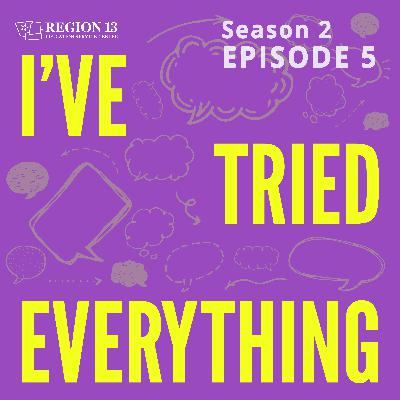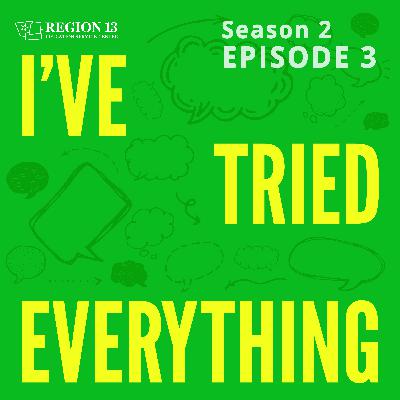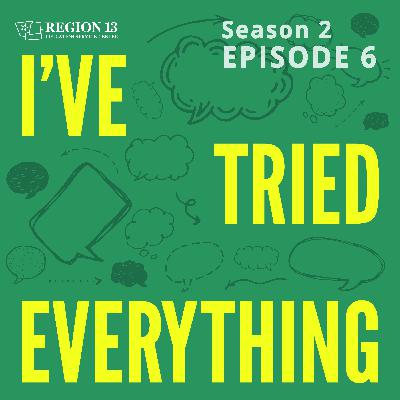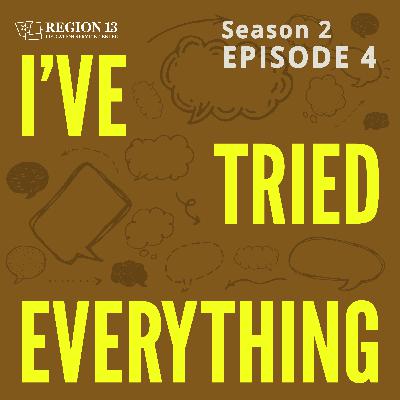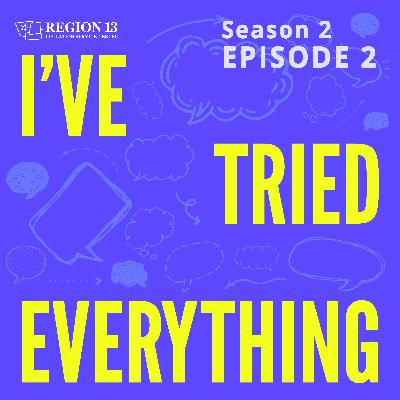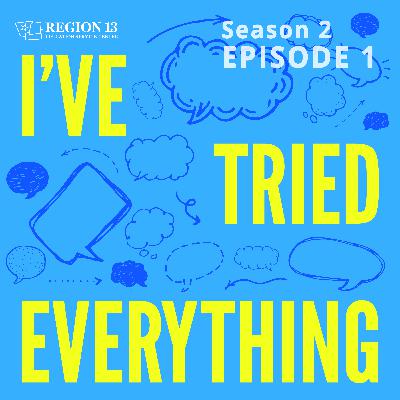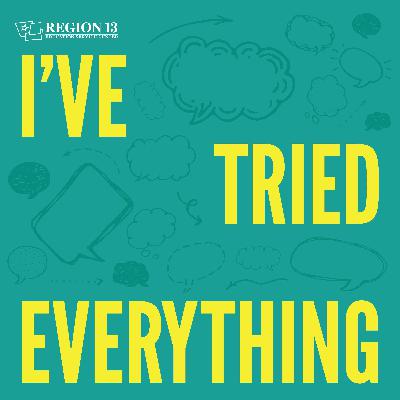S2-Ep5 - It's A Skill, Not A Will
Description
Angela:
Hello, welcome back to I've Tried Everything, a podcast focusing on behavior supports in schools. I'm your host, Angela Isenberg, project coordinator at Region 13. Every week I talk with educators just like you. We cover some tough topics, share stories, and explore what works and what doesn't. Let's go.
I am very excited today to be joined by my boss, Albert Phelps, here at Region 13. Albert, you and I have had a working relationship for well over 20 years. You started with me back as an Emilio gen ed teacher on a high school campus doing positive behavior interventions and supports. How have you seen behavior from when you first started working with me 20 years ago to now? How have you seen behavior change?
Albert:
I think one of the things that continues to evolve and continues to be a bit of a navigational challenge for staff is the fact that we are better consumers of what behavior support looks like than we've ever been in the past. So in the past, if someone had a behavior challenge, we would identify them, we would put them in a specialized program, we would give them support, and that would be the end of it. They either made progress or they didn't make progress. Now we have multiple options out there, and if something doesn't work, we have better educated parents, better educated teachers, and the levels of intervention are dramatically larger and the opportunities are dramatically larger for the supports that we can provide to kids.
Angela:
So thinking about students in that 20 years that I've known you, how have you seen behavior change, especially after the pandemic?
Albert:
I don't necessarily see that behavior has changed as much as our response to behavior has changed. We have spent a lot of time over the last year and a half talking about learning gaps and learning gaps specifically as it relates to academic learning. What we fail to address sometimes is that there's also been social behavioral gaps that were developed during that time. So opportunities for kids to learn social skills, opportunities for kids to learn appropriate ways to have school behavior. So last year I spent most of my time in second grade classrooms, and as a result of that, here's what I learned. I learned that a lot of our second graders were acting like kindergarten students, not because they had developmental challenges that caused them to act like kindergarten students, but because the last time they were in school, they were in pre-K or kindergarten. So they had not learned how to be a second grade student.
Our response typically is this kid's not acting like a second grade student, therefore they must be a behavior challenge as opposed to taking a step back and saying, I need to remember that they haven't learned those skills yet. So just like if there's a reading gap, we need to reteach reading. If there's a behavioral gap, we need to teach the skills they need to have in order to better become the type of student we expect to see in second grade.
Angela:
So thinking about that skill gap, there's definitely a place in education for positive behavior, interventions and supports, restorative practices, leadership and character development. One of the processes that we've embraced at Region 13 over the last maybe a year and a half, is Leader in Me. So thinking about Leader in Me, why are you so jazzed about this process?
Albert:
Leader in Me is a program that is based on FranklinCovey's, Seven Habits of Highly Effective People. When we think about those seven habits, being proactive, beginning with the end in mind, putting first things first, thinking win-win, seek first to understand then be understood, to synergize, and to sharpen our saw, when we think about those skills, those skills really for me are the last best hope we have for students. But also it really is re-energizing and it's an opportunity for adults to have renewal. I think we have all struggled over the last three years thinking about how do we navigate the new norm. How do we deal with the fact that we did have a period of time where we were not in schools, but the expectation was that learning was still going to occur. We also had a period of time where we've had extensive amounts of mental health challenges as well as increased anxiety.
We have lots of people that have dealt with loss over the last three years, and as a result of that, we need an opportunity to give people skills to inspire hope, and more importantly, we need to make sure that we are allowing our students to become their best possible selves. For me, the Leader in Me program is about hope, and I think sometimes we move away from the opportunity to talk about hope and look at what can we do to have students become inspired to be their best possible selves at the end of the day.
Angela:
We've had lots of conversations, you and I, about you have to start with staff behavior before you move to student behavior. Is Leader in Me starting with staff and addressing staff behavior first and then moving into that student level. Is that kind of the process for Leader in Me?
Albert:
Absolutely. The process for Leader in Me is we begin with adults, if we are not switching and working on changing their paradigms, it's really hard for us to see students in a different light. One of the five basic paradigms that I really land on with Leader In Me is moving away from that, some kids are gifted to everybody has genius. And if I think about that and I had that in the front and center of my mind, sometimes finding the genius in somebody takes a little bit longer and it's a little bit deeper dive, but everybody has potential, everybody has genius. It just may not look like the genius that we expect somebody to have sitting in a row in a school doing what we ask them to do, being on task, doing all the things that typical students look like.
Angela:
So it's out of the box thinking around really how do we meet students where they're at to get them maybe where we want them to be?
Albert:
Exactly.
Angela:
So I had the great opportunity last week to sit in a training with you on moving away from this idea of motivating the unmotivated from a motivation issue to an inspirational issue. Talk to me about how that we need to embrace this concept to help motivate students differently.
Albert:
Well, I believe what you're talking about is one of my new favorite leadership books that I've read and it's, Trust & Inspire, by Stephen M.R. Covey. And in the, Trust & Inspire concept, one of the things that he talks about is that motivation really is based on a carrot and stick principle. If we think about motivation, if you do this, you get something from me for doing this, or if you continue to do this and I don't like it, then there's going to be some kind of consequence that hopefully will change your behavior. Motivation is all about us doing something to somebody else, moving them from point A to point B. When we look at inspiration, it's about tapping into what internally is intrinsically there for us and how to unleash that full potential and allow people to be their best possible selves based on what they are bringing to the table, not what we think they should bring to the table.
Angela:
So it's about really student empowerment, right? It's empowering them to drive their own education and their own process through their own inspiration.
Albert:
It's about having belief and it's about believing in being able to do the right thing if they are inspired to do it.
Angela:
But that really has to have that element of trust in place I think in both ways. The student has to be able to trust educators and the educators have to be able to trust students for that to actually play out, right?
Albert:
Absolutely. The basic premise of the book is that we have to move from a command and control way of leading to a trust and inspire way of leading. And if you think about command and control, it's all about, I put parameters in place, I tell you what you need to do, and then I monitor it to make sure that it's done, as opposed to believing that people are going to do the right thing. And our job is to make sure that we remove the barriers, inspire them to want to do the right thing at the end of the day. It's a mindset change. It's a change in our paradigm.
Angela:
It kind of takes me to the social discipline window for restorative practices where you look at the control and belief and nurturing that needs to be in place. Support, if you're high in support and you're high in control, then you are in that, with, category. You're not doing things for students, you're not doing things to students, you're doing things with students. So it sounds like we need to be in that, with Rome, so that we are working with students for their own success through inspiration and trust.
Albert:
Absolutely. At the end of the day, I think we need to stop telling people what to do, and we need to start doing things with people.
Angela:
Wouldn't that also be the same with staff?
Albert:
Absolutely.
Angela:
Because, of course, I'm a TikToker, so Albert knows all about my guilty obsession with TikTok and definitely teacher TikTok. But I really enjoy seeing some of, and hearing some of the teachers talk about the things that they're being asked to do or told to do instead of engaging them in that process. So huge teacher TikTok. We were a fan girl the other day with the subbing superintendent that we had at our curriculum council. So Albert, if you had to pick your top three strategies for teachers, educators, out of school time staff dealing with behavior, what would be your top three strategies that you would recommend for teachers or staff to have in their tool belts?
Alber

